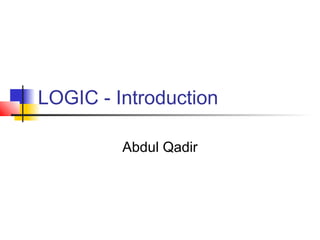
Logic introduction
- 1. LOGIC - Introduction Abdul Qadir
- 2. Objectives 1. Sharpen the intellect of the students. 2. Develop their learning ability; 3. Strengthening their understanding; and, 4. Promote clear thinking;
- 3. Importance No other instrument can successfully replace reason Our well being depends upon knowing what truly is the case Essential for decision
- 4. Benefits of Studying Logic Supports the use of our reasoning powers Helps to make them more dependable We learn how to defend judgments Using logic we bring our intellectual capacities to maturity and fruitfulness We learn to distinguish good arguments from bad ones
- 5. Benefits of Studying Logic Logical behavior Logical mind Illogical – procedures or inferences that are faulty, not rationally defensible The study of logic helps one to reason well by illuminating the principles of correct reasoning
- 6. Benefits of Studying Logic We learn the principles of clear and accurate thinking Skills of correct reasoning never become obsolete AIM To learn how to test arguments and to evaluate them.
- 7. Subject Matter of Logic Methods and techniques of logic that distinguish efficiently between correct and incorrect reasoning are the subject matter of logic.
- 8. DEFINITION Logic is the study of the methods and principles used to distinguish correct reasoning from incorrect reasoning.
- 9. Aristotle Father of logic Aristotle called logic the organon, or instrument, of all sciences. Criteria to judge argument Deductive syllogism
- 10. What is correct reasoning? If the premises do provide adequate grounds for accepting the conclusion, if asserting the premises to be true does warrant asserting the conclusions also to be true, then the reasoning is correct otherwise it is incorrect.
- 11. Reasoning Reasoning is a special kind of thinking in which problems are solved, in which inference take place, that is, in which conclusion are drawn from premises. Our ability to use reasoning is our most reliable and successful means for developing sound judgments around the world around us.
- 12. Reasoning There is no area of life where reasoning is completely irrelevant or wasted. To give up on reasoning would mean to give up on thinking itself. Logic is undeniable: In order to attempt to refute it, one has to use it… thereby affirming it. “I can’t speak a word in English”. The statement itself has been negated. I don’t exist.”
- 13. Reasoning Can one take or leave logic? Is logic only applicable to certain topics? Is logic optional or true only for fields of inquiry? One cannot not use logic. Logic/reason is a precondition of all intelligible thinking. Without logic there would be no such things or concepts as true or false.
- 14. Inference Inference is a process by which one proposition is arrived at and affirmed on the basis of some other proposition or propositions. Inference may be “immediate” if only one premis is relied upon, or “mediate” if more than one premis is relied upon. Inferences are implications, and part of logic is recognizing what a statement implies and what it doesn’t.
- 15. Premises Premises are the propositions upon which inference is based; the propositions that are claimed to provide grounds or reasons for the conclusion.
- 16. Proposition A proposition is something that may be asserted or denied. Only proposition assert that something is ( or is not) the case, and therefore can be true or false. the building blocks of every argument. Proposition are declarative sentences
- 17. Proposition Every proposition is either true or false, although the truth or falsity of some given proposition we may not know. Example: there is life on some other planet in our galaxy. Simple and compound propositions.
- 18. Argument: the primary Focus of Logic An argument is any group of propositions of which one (the conclusion) is claimed to follow from the others (the premises) which are regarded as providing support for the truth of that one.
- 19. Argument Ist Prop:A) All men are mortal. (major premise) 2nd Prop: B) Socrates is a man. (minor premise) Therefore: 3rd Proposition: C) Socrates is mortal (Conclusion)
- 20. Sound Argument If A, and B, then C. Just statement 1, statement 2, so therefore, statement 3. The conclusion follows logically from the premises.
- 21. Unsound Argument 1st Prop: A) All chickens have two legs. (major premise) 2nd Prop B) Socrates has two legs (minor premise) Therefore: 3rd Prop: C) Socrates is a chicken. (conclusion)
- 22. Laws of Logic 1. The law of non-Contradiction 2. The law of Identity 3. The law of Excluded Middle 4. The law of Rational Inference
